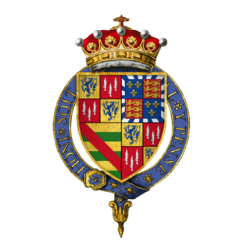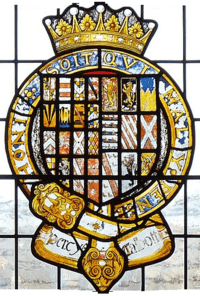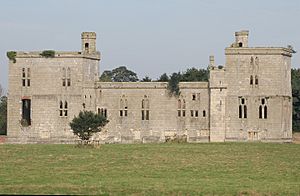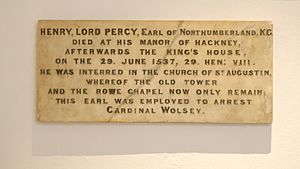Henry Percy, 6th Earl of Northumberland facts for kids
Quick facts for kids
Henry Percy
|
|
|---|---|
| The Earl of Northumberland | |
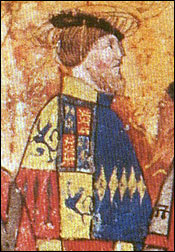
Henry in the Black Book of the Garter, c. 1534
|
|
| Born | c. 1502 Nottingham |
| Died | 29 June 1537 |
| Buried | Hackney Church |
| Noble family | Percy |
| Spouse(s) | Mary Talbot |
| Father | Henry Percy, 5th Earl of Northumberland |
| Mother | Catherine Spencer |
Henry Percy, the 6th Earl of Northumberland (born around 1502, died 1537), was an important English nobleman. He served as a military officer in northern England. Today, he is mostly remembered because he was once engaged to Anne Boleyn. He was forced to end their engagement before she became involved with and later married King Henry VIII.
Contents
Henry Percy's Early Life
Henry Percy was born around 1502. He was the oldest son of Henry Algernon Percy, 5th Earl of Northumberland and Catherine Spencer. His mother was a first cousin of William Carey, who was Anne Boleyn's brother-in-law.
When Henry was young, he was sent to serve as a page in the household of Thomas Wolsey. This was a common way for young noblemen to learn about society and prepare for their future roles. Henry was knighted in 1519. Much of what we know about Henry's early life comes from a book written by George Cavendish, who wrote about Wolsey.
Henry Percy and Anne Boleyn
Henry's father had planned for him to marry Mary Talbot by 1516. She was the daughter of George Talbot, 4th Earl of Shrewsbury. However, Henry fell in love with Anne Boleyn, who was a young lady at the royal court.
Henry and Anne became engaged, probably in the spring of 1523. At this time, Henry was still serving Wolsey. When Wolsey found out, he was very angry. He scolded Henry because permission for the marriage had not been asked from Henry's father or from the King. The King had a special interest in this marriage because the Northumberland earldom was very important. Some people believe the King was already interested in Anne himself, which might explain Wolsey's strong reaction. Soon, Henry's father learned about the engagement and sent for his son.
There were other reasons why the marriage was not allowed. Anne was also intended to marry James Butler, 9th Earl of Ormond. This marriage was meant to help settle a disagreement over land and titles in Ireland. Another big reason Henry's father refused the marriage was that he thought Anne Boleyn, who was only a knight's daughter, was not important enough for his son and heir.
Marriage to Mary Talbot
Henry's father was very upset with him. He reportedly called Henry "proud, presumptuous, and a wasteful person." Henry was quickly married to Lady Mary Talbot. This happened in early 1524 or 1525. It was not a happy marriage. Henry's father gave the couple very little money or comfort.
By 1528, only a few years into their marriage, their relationship had completely broken down. Henry suspected his wife was spying on him. Her father worried that Henry was treating her badly. Henry was very angry about these suspicions. The couple separated, and Mary later had a stillborn child at her father's home in April 1529. In 1532, Mary accused Henry of having been previously engaged to Anne Boleyn. Henry denied this under oath.
In 1536, Mary had been living with her father for two and a half years. Around the same time, Henry announced that he would leave all his property to the King. He had no children, and he and Mary were not likely to have a child together. He was also not on good terms with his brothers and did not want them to inherit his property. Mary Talbot disliked Henry for the rest of his short life and later tried to get a divorce.
Henry Percy's Duties and Challenges
In July 1522, Henry Percy became a member of the Council of the North. In October, he was made a deputy warden of the East Marches. This meant he was responsible for defending the border with Scotland.
On May 19, 1527, he became the 6th Earl of Northumberland after his father's death. He was also made Lord Warden of the East and West Marches. This was a very important job, but it was also very difficult.
Henry was often sick with a feverish illness, possibly malaria. He was also deeply in debt. Despite this, he had to maintain his household and lead military actions. Cardinal Wolsey often treated him in a way that showed he thought he was better than Henry. Henry was not often allowed to visit the royal court, or even attend his own father's funeral.
Despite his challenges, Henry was very active on the borders. In 1530, while he was at Topcliffe, he received an order from the King to go to Cawood and arrest Wolsey. Henry sent Wolsey south as a prisoner. Henry was also one of the noblemen who signed a letter to the Pope in July 1530, asking for the King's divorce to be sped up. On April 23, 1531, he was made a Knight of the Garter, a very high honor. In 1532, he became the High Sheriff of Northumberland for life and a privy councillor.
Henry also took part in the trial of Lord Thomas Fiennes, 9th Baron Dacre. Dacre was accused of treason. He first said he was innocent but was later convinced to change his plea to guilty. He hoped for mercy from the King, but it was not given. Dacre was executed.
In May 1536, Henry Percy, whose health was very poor, was part of the group of noblemen who judged Anne Boleyn's trial. It is said that Anne confessed to having been previously engaged to him, hoping it would save her life. After the decision was made, Henry collapsed and had to be carried out.
Later Life and Death
Since Henry had no children, he began to plan for his property. In February 1535, he wrote to Thomas Cromwell that he had decided to make the King his heir. He confirmed this decision later. In 1536, he was made Lord President of the Council of the North.
In September 1536, he received money to come to London to arrange his lands. However, the Pilgrimage of Grace rebellion began before he could finish. Henry's brothers and mother supported the rebels, but Henry himself remained loyal to the King. The rebel leader Robert Aske and his men came to Wressle Castle, where Henry was sick in bed. They asked him to give his border commands to his brothers or join the rebels. Henry refused both requests. He was sent to York to protect him from rebels who wanted to harm him.
Henry gave his estates to the King. He had hoped they would then go to his nephew. However, when his brother, Sir Thomas, was found guilty of treason and executed, Henry made the gift to the King unconditional in June 1537. By this time, his mind was failing.
Henry Percy died on June 29, 1537. He was buried in St Augustin's Church, which is now the site of St John at Hackney parish church. A memorial plaque was found during a renovation in 2020 and put back inside the church.
Family
Henry Percy married Mary Talbot in 1524. They did not have any children who survived. The earldom (his title) was put on hold after his death. However, it was later given to his nephew, Thomas. Henry's widow, Mary, lived until 1572.
Henry's two brothers, Sir Thomas and Sir Ingelram Percy, helped manage his lands. Both of them were leaders in the Pilgrimage of Grace rebellion. They were arrested. Sir Thomas was found guilty of treason and executed in 1537. His sons, Thomas and Henry, later became the 7th and 8th Earls of Northumberland. Sir Ingelram Percy was held in the Beauchamp Tower. He was soon set free, went to live abroad, and died on June 30, 1537. He had a daughter named Isabel, who married Henry Tempest in 1544.
 | William M. Jackson |
 | Juan E. Gilbert |
 | Neil deGrasse Tyson |


